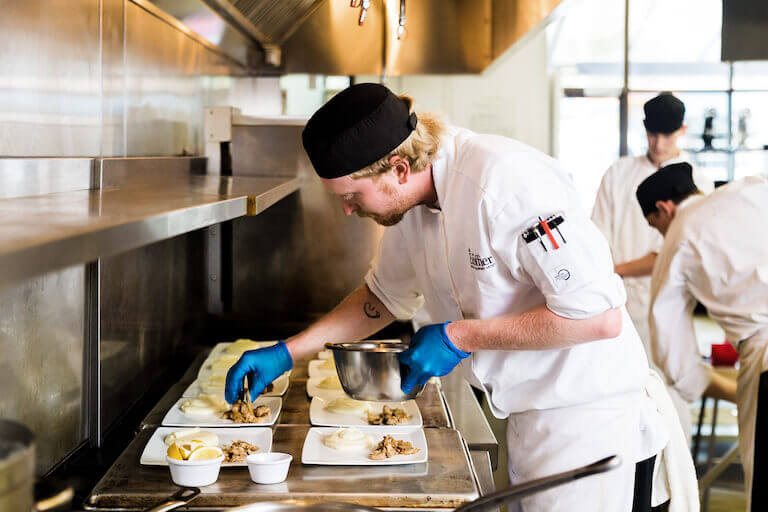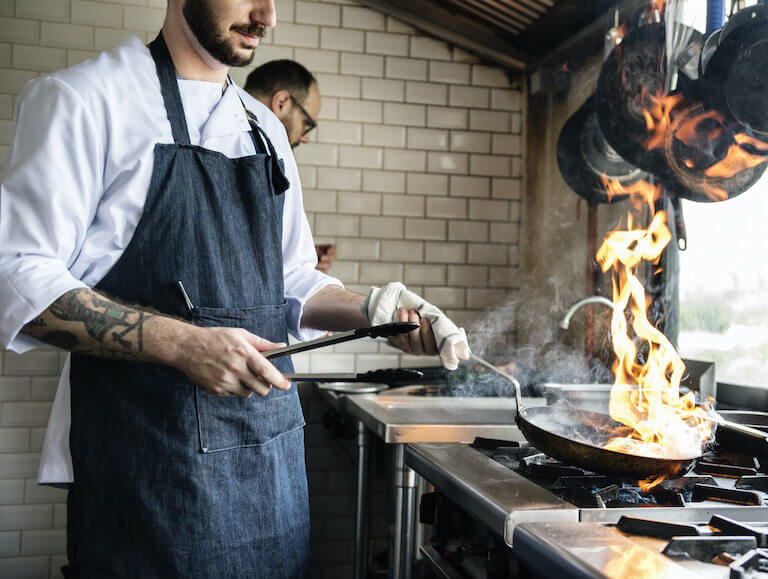Numbers are important in the kitchen – whether we’re talking about ounces, temperatures, or dollars.
If you’re considering a career as a chef, your future earning potential could impact your goals and how you choose to achieve them. With some culinary schools costing as much as a private four-year college, you’ll need to make sure the numbers are feasible before you commit.
While you won’t necessarily be able to predict exactly what you might earn in the future, having a ballpark salary in mind can help guide your culinary journey and facilitate smart decision-making. Find out how much different chefs can earn, and the factors that go into those figures.
How Much Does the Average Chef Make?*
Here’s the quick answer. According to data collected by the U.S. Bureau of Labor Statistics, chefs and head cooks earn an average of $58,740 per year, or $28.24 per hour.1 The lowest earning 10% of chefs average an annual salary of $30,300, while the top earning 10% earn an average salary of $90,790.2
Of course, that’s not all there is to it. This BLS statistic includes executive chefs, head cooks, chefs de cuisine, and sous chefs all within the same data set. There may be other types of chefs included as well—the site does not include a comprehensive list of how they define “chefs and head cooks.”
Other resources are more specific. Salary.com, for example, lists the average executive chef salary as $73,045, with the top 10% of earners reaching over six figures.3 The same site lists the average sous chef salary as $49,140.4 So there’s quite a large variance, depending on the type of chef.
A chef’s salary depends on a number of factors, including type of chef, education level, years of experience, type of establishment they work at, and location of the business.
Let’s explore the numbers for some more specific types of chefs. Then we’ll discuss the variables that determine a chef’s salary.
How Much Do Pastry Chefs Make?*
Pastry chefs specialize in desserts and sweet baked goods. According to data collected by Salary.com, pastry chefs in the U.S. earn an average salary of $58,128. Salaries range between $50,333 and $82,815.5 Pastry experts may find that they can earn a higher salary in larger establishments like hotels and resorts, rather than in small restaurants or bakeshops.

How Much Do Catering Chefs Make?*
Catering chefs work for catering companies where they cook for events like weddings, parties, and corporate gatherings. Data from ZipRecruiter shows catering chefs earning an average of $41,475 per year, with the middle 50% of chefs earning between $31,000 and $63,000.6
Some catering companies command very high prices, providing sumptuous feasts for high-end weddings and events. Chefs at these companies can earn salaries at the higher end of the spectrum.
How Much Do Private Chefs and Personal Chefs Make?
Private Chef Salaries*
Private chefs are in-house chefs who usually work for a single client or family. This is a luxury service, which is why private chefs have the potential to earn a substantial living. According to Salary.com, private chefs earn an average of $67,954 per year. The middle 50% of private chefs make between $57,908 and $82,158.7

Personal Chef Salaries*
Personal chefs cook for a larger roster of clients. They often create “make-ahead” meals that the clients can then reheat when they’re ready to eat. This is a wonderful way for busy people to get healthy, home-cooked food without spending time and effort at the grocery store or in the kitchen. Personal chef menus may focus on certain dietary restrictions, like gluten-free, plant-based, or keto.
Salary.com reports that personal chefs earn an average of $52,348. The median 50% of personal chefs make between $44,609 and $63,290 per year.8

Take the Culinary Career Survey
We’ve compiled a checklist of all of the essential questions into one handy tool: career options, culinary interest surveys, educational opportunities, and more.
The Factors that Contribute to a Chef’s Salary
These salaries are all averages and ranges, which means there are chefs on the high side and the low side of the scale. So what are some of the factors that may impact a chef’s earning potential?
Culinary Education
With a formal culinary education, chefs may be able to earn a higher salary than they would without that credential. This will vary greatly from employer to employer, with some preferring culinary school graduates and some focusing more on a chef’s years of experience.
A culinary education may also help cooks to progress through the ranks in the kitchen more quickly due to their depth of knowledge and less on-the-job training needed, potentially reaching that chef title sooner and increasing their career-long earning potential.

Industry Experience
As with most other industries, the most experienced chefs can usually earn the highest salaries. Here’s how Payscale estimates that experience impacts average salaries for executive chefs:9
- Entry level salary – $53,000
- Early career (1-4 years) – $55,000
- Mid career (5-9 years) – $58,000
- Late career (10-19 years) – $63,000
- Experienced (20+ years) – $69,000
Market
Different cities (and countries) have higher or lower costs of living, which may translate into higher or lower salaries. All other factors being equal, chefs in major cities like Chicago, New York, Los Angeles, and San Francisco can often have higher salaries than those in mid-sized cities, who may have higher salaries than those in small towns.
Type of Food Establishment
Food service establishments vary widely in their size, price point, and even their purpose. Retirement homes and hospitals, for example, need cooks and chefs but their primary purpose isn’t to serve food. A resort or hotel may rely on their food offerings as a major draw and money maker for their operations. And a small gastropub will be highly food-focused, but may not be large enough to support staff salaries in the upper ranges. These factors can impact what the establishment may be able or willing to pay their chefs.

Max Out Your Chef Salary
The numbers show that being a chef can potentially be a lucrative career. And when you invest in education, build your experience, and work with the right companies, you may be able to maximize your earning potential. Some chefs also have side hustles and passion projects that bring them additional streams of income!
Interested in becoming a chef? You set the destination, and we can help you get on the path to reach it. Escoffier offers degree and diploma programs in five different disciplines, including culinary arts, baking and pastry, and plant-based culinary arts. Contact us to learn more about each program and discover which is right for you.
To learn more about culinary and pastry careers, read these articles next:
- How to Become a Chef: The Complete Guide
- Top Remote Culinary Careers
- The Difference Between a Cook and a Chef
*Information may not reflect every student’s experience. Results and outcomes may be based on several factors, such as geographical region or previous experience.
1All salary data from January, 2022
2https://www.bls.gov/oes/current/oes351011.htm
3https://www.salary.com/research/salary/benchmark/executive-chef-salary
4https://www.salary.com/research/salary/benchmark/sous-chef-salary
5https://www.salary.com/research/salary/listing/pastry-chef-salary
6https://www.ziprecruiter.com/Salaries/Catering-Chef-Salary
7https://www.salary.com/research/salary/posting/private-chef-salary
8https://www.salary.com/research/salary/posting/personal-chef-salary
9https://www.payscale.com/research/US/Job=Executive_Chef/Salary

